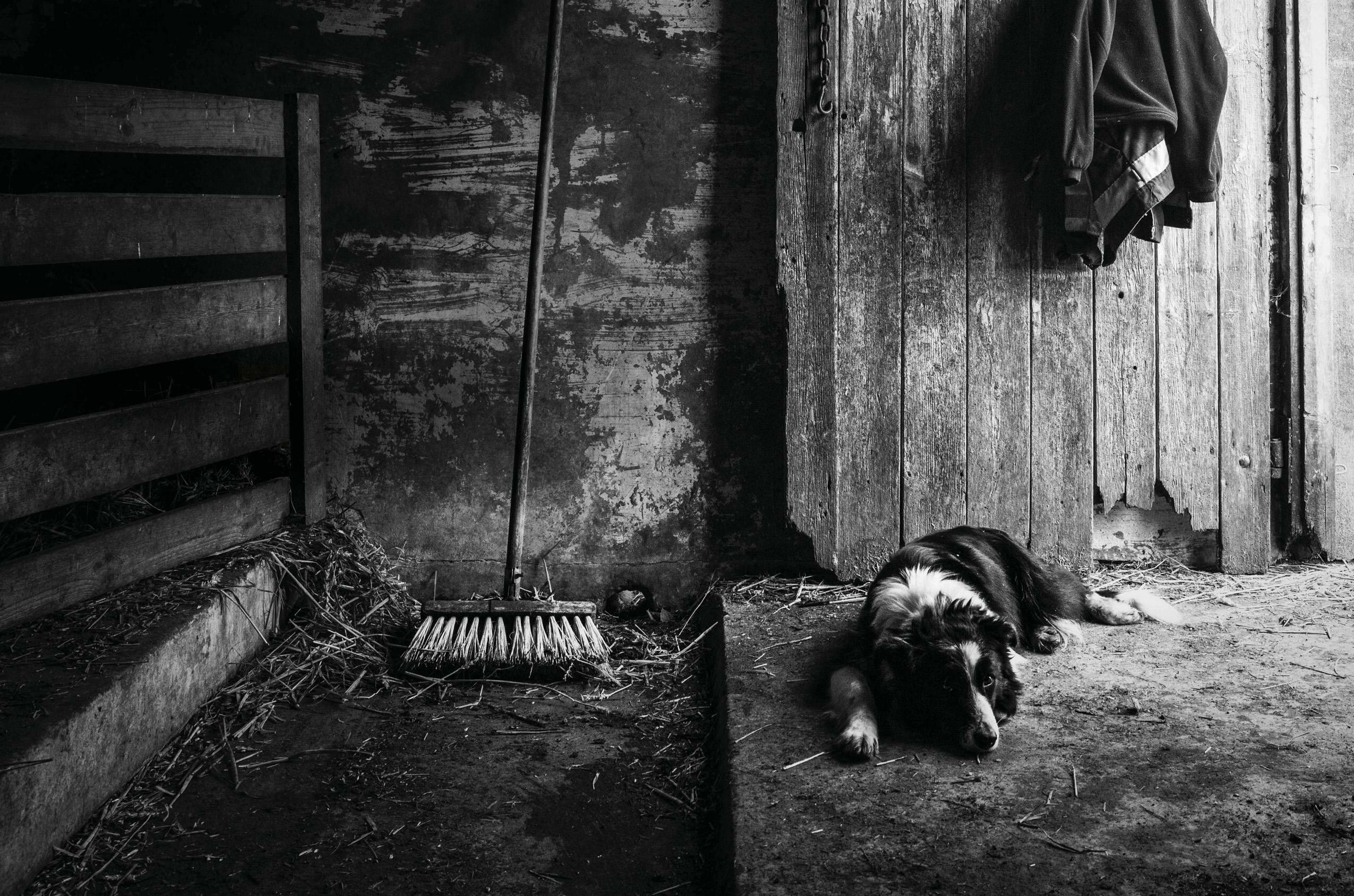
An excited bark comes from the kennels as the dogs hear the door slam and my boots scrape on the yard. They know their day is about to begin - a day full of stimulation. They bounce around their kennels with excitement as we get them out for their day's work. Their life would be envied by most pet dogs.
Three border collies work at Croft Foot Farm, our 364-hectare property in Cumbria. My husband, Colin, does the bulk of the farm work, using the collies mainly as sheepdogs. The four of them make a formidable team in looking after our 1,200 breeding sheep.
At any one time, we tend to have a lead dog who does the main bulk of work. There will also often be a retired dog who potters around the yard and comes out on busy days. And a third dog to mop up, possibly a young dog in training.
But we also have a fourth dog, Meg. She's mine, and has become more of a 'model' dog.
I'm a photographer as well as a farmer, and host Farm Photography Tours at Croft Foot. Meg demonstrates shepherding skills for my clients and poses for portraits. She also adores coming on walks with our children.
AN EDUCATION
Working dogs, of course, need to be taught. A fully trained dog will start work at around two years of age. Training sheepdogs is very challenging. You can train a dog to think, or you can train a dog to respond exactly to command. If you focus solely on the latter, then once the dog is out of sight it can't think for itself. Fell dogs, which assist in gathering livestock across the hills and commons, need to be able to think for themselves much more than other farm dogs. This is an ability that comes from experience, especially from gathering with other dogs and learning the hefts (the communal grazing areas on the fells).
この記事は BBC Countryfile Magazine の June 2023 版に掲載されています。
7 日間の Magzter GOLD 無料トライアルを開始して、何千もの厳選されたプレミアム ストーリー、9,000 以上の雑誌や新聞にアクセスしてください。
すでに購読者です ? サインイン
この記事は BBC Countryfile Magazine の June 2023 版に掲載されています。
7 日間の Magzter GOLD 無料トライアルを開始して、何千もの厳選されたプレミアム ストーリー、9,000 以上の雑誌や新聞にアクセスしてください。
すでに購読者です? サインイン

Guilt-Free Meat? - Should the world stop eating meat to tackle the climate crisis? Chris Baraniuk meets an experimental farmer who says we don't all have to become vegetarians
Should the world stop eating meat to tackle the climate crisis? Chris Baraniuk meets an experimental farmer who says we don't all have to become vegetarians. Livestock farming around the world is facing scrutiny because of its greenhouse gas emissions. Globally, the sector contributes somewhere between 11.1% and 19.6% of total emissions. Meat production is roughly twice as bad as the production of plant-based food, according to some analyses. And beef is the worst of all. Study after study has suggested that, in order to curtail the devastating effects of climate change, we ought to shift to a diet containing less meat - or even go vegetarian or vegan.

Discover Cider Country - Explore mellow golden countryside, pedalling between medieval villages, historic inns and fruitful orchards, on a delightful Herefordshire Cider Circuit adventure with Julie Brominicks
Explore mellow golden countryside, pedalling between medieval villages, historic inns and fruitful orchards, on a delightful Herefordshire Cider Circuit adventure with Julie Brominicks. I'm cycling Porter's Perfection, one of three cider circuits developed for Visit Herefordshire over the past few years. Each showcases a section of this bucolic county's loveliest villages, pubs, orchards and cidermakers via lanes suited to bicycles - e-bikes for hill-averse cyclists like me. The idea is to allow you to appreciate the sights, sounds and smells of cider country while traversing roads never meant for modern cars. If you have dodgy knees, or are keen to indulge in the local adult apple juice as you go (remember, it's illegal to cycle while under the influence), Visit Herefordshire also promotes cider bus routes.

TOP 10 WILD AUTUMN FOODS
Make the most of seasonal abundance with foraging tips and recipe ideas from wild food expert Liz Knight

The taste of England
Amid pastures farmed by her family for more than four centuries, Mary Quicke is reviving forgotten dairy traditions to produce delicious Devon cheeses

How to eat 30 plants a week
As science proves the many health-boosting benefits of eating at least 30 different plants each week, Hugh Fearnley-Whittingstall shares recipes to help you meet the magic target

RARE RAFT SPIDER MAKES A COMEBACK
Thanks to dedicated conservation work, this impressive but vulnerable arachnid is resurgent in East Anglia

SPECTACULAR STONEHENGE FINDS
Following the latest astonishing revelation about the Stonehenge Altar Stone's Scottish origins, Dixe Wills looks at recent discoveries that have changed the way we view this impressive and enigmatic Neolithic monument

GALLOWAY NATIONAL PARK DEBATE
Would this protected status bring welcome recognition and attention - or overcrowding and problems for farmers?

Farmers are valued, so why do they feel we don't care?
For farmers out in their fields in all seasons, worried about the future as dramatic levels of rainfall blamed on climate change damage their crops, inflation and uncertainty push up their costs and what they see as unfair imports threaten their livelihoods, here's a spot of unexpectedly good news: the rest of us think you are doing a good job.

Pumpkin patches
Find the perfect jack-o'-lantern for Halloween at a pick-your-own pumpkin patch. Some are simple affairs in tranquil countryside; others offer activities ranging from ghost trains to spooky mazes.